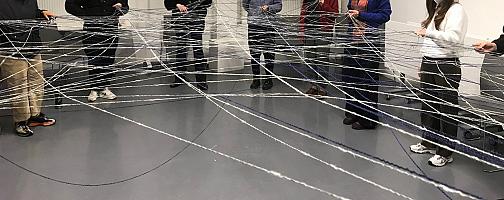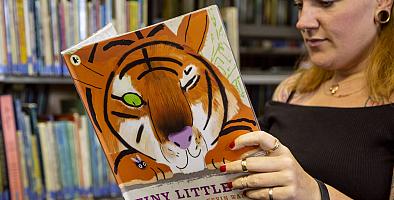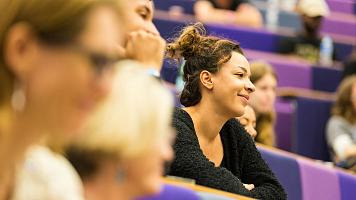MA
Children's Literature: Children's Book Illustration
Content navigation menu
Why study children's book illustration at Goldsmiths
Immerse yourself in the exploration of practical and professional approaches to children’s book illustration and writing for young children.
- This Masters is taught by Goldsmiths Department of Media, Communication and Cultural Studies, with some learning taking place in the Department of Education Studies.
- To refine your practical illustration skills and ideas by working on projects that focus on materials and their combination; colour, tone, creating atmosphere, addressing the reader, and the relationship of illustration to text. At the end of the programme there will be an opportunity to exhibit your work.
- To study bespoke modules in: Children’s Publishing which will help you with promoting your work and establishing dialogues with designers, editors, and agents; Picture Book Writing where you will learn how to write a picture book text that you will be given the chance to illustrate for your final project.
- To benefit from exposure to professional networks; recent visits have included Macmillan Children’s Books, Farshore, an imprint of Harper Collins, and Walker Books, the Association of Illustrators with guest lectures from established illustrators and visits to illustration studios.
- To be taught by specialist teaching staff, including prominent children’s authors and illustrators.
- To develop more than your practical skills: we draw on both professional and critical perspectives from art and education, cultural studies, design, and sociology to deliver a comprehensive and interdisciplinary approach to the subject of illustration. We expect you to interrogate the power relations that determine what is published, distributed and selected to be read by children.
- The Department of Media, Communications and Cultural Studies has been ranked second in the UK for 'world-leading or internationally excellent' research (Research Excellence Framework, 2021) and 16th in the world (third in the UK) in the 2024 QS World Rankings for communication and media studies.
You can explore our students' work by visiting our Illustration@Goldsmiths Instagram page.
Contact the department
If you have specific questions about the degree, contact Bruce Ingman.
Length
1 year full-time or 2 years part-time
Entry requirements
You should have or expect to achieve an undergraduate degree of at least 2:1 standard in a relevant area or have equivalent professional experience. Those who haven’t completed a degree in an art and design subject area will also be required to provide a portfolio. See more information below.
Fees
Home - full-time: £11250
Home - part-time: £5625
International - full-time: £24350
Departments
Educational Studies
Media, Communications and Cultural Studies
Other options for studying children's literature
There are also two other options for those who wish to take a Masters in this area:
- MA Children’s Literature: Theoretical Approaches to Children’s and Young Adult Literature (Theory and Criticism pathway)
- MA Children’s Literature: Creative Writing for Children and Young Adults (Creative Writing pathway)
What you'll study
The modules you will study on this degree cover both the theoretical and the practical aspects of illustrating for children’s literature, with a module dedicated to learning the skills needed to successfully navigate the world of children’s publishing as a freelance illustrator.
| Module title | Credits |
|---|---|
| Children’s Literature, Culture and Diversity | 30 credits |
| Children's Book Illustration Practice | 30 credits |
| Children's Publishing | 30 credits |
| Children's Book Illustration: Final Project | 60 credits |
| Picture Book Writing | 30 credits |
Note about optional modules (if available): The above is indicative of the typical modules offered, but is not intended to be construed or relied on as a definitive list of what might be available in any given year. The module content and availability is subject to change.
Assessment
Assessments build on lectures and seminars so students are expected to attend all taught sessions to build knowledge and their own understanding of their chosen discipline. All assessed work is accompanied by some form of feedback to ensure that students’ work is on the right track. It may come in a variety of forms ranging from written comments on a marked essay to oral and written feedback on developing projects and practice as they attend workshops.
Facilities
The Professor Stuart Hall and Media Research Buildings offer a wide range of seminar and teaching rooms designed for flexibility and practical work, and an IT suite with state-of-the-art computer equipment.
Access is available weekdays 8am-8pm when not in use for teaching.
We also have a range of computer service facilities mainly located in the Rutherford Building (Library and IT Services). Laptops can be borrowed from this building for use on campus.
We have printmaking facilities in the studio and visit off-campus specialist studios for silkscreen and riso printing workshops.
Entry requirements
For direct entry onto the degree, you should have or expect to achieve an undergraduate degree of at least upper second-class standard in a relevant area such as graphic design, illustration or art, or have equivalent professional experience.
We welcome applications from candidates you haven’t completed an UG degree in an art and design subject area. You will also be required to provide a portfolio as part of your application.
International students also have the option to study English language as part of the pre-sessional programme.
International qualifications
We accept a wide range of international qualifications. Find out more about the qualifications we accept from around the world.
If English isn’t your first language, you will need an IELTS score (or equivalent English language qualification) of 6.5 with a 6.5 in writing and no element lower than 6.0 to study this programme. If you need assistance with your English language, we offer a range of courses that can help prepare you for postgraduate-level study.
Student work
For more examples of student work, please visit the Illustration@Goldsmiths Instagram page.
How to apply
Apply directly to Goldsmiths using our online application system
Before submitting your application you’ll need to have:
- Details of your education history, including the dates of all exams/assessments
- The email address of your referee who we can request a reference from, or alternatively an electronic copy of your academic reference
- A personal statement – this can either be uploaded as a Word Document or PDF, or completed online. Please see our guidance on writing a postgraduate statement.
- A portfolio of 15-20 examples that represent your visual practice (see below for guidance).
- If available, an electronic copy of your educational transcript (this is particularly important if you have studied outside of the UK, but isn’t mandatory)
You'll be able to save your progress at any point and return to your application by logging in using your username/email and password.
We welcome applications from candidates who haven’t completed an undergraduate degree in art and design.
Portfolio
Your portfolio must be submitted as a single pdf digital file. Include pieces such as finished and preparatory illustrations, storyboards, character development, animated sequences, 3D work. We are particularly interested in seeing your observational drawings, eg of your local environment, people, animals, life drawings.
We are also interested in the ideas behind your work and your thought process. Please present your research methods and routes clearly, showing how these translate into your final outcomes. Avoid cramming too many small images onto one page as we may not be able to read the imagery properly.
Translations for any examples provided in another language would be helpful.
For any moving image work please put a hyperlink in your pdf digital portfolio to a video sharing site such as YouTube or input a URL link.
When to apply
We accept applications from October for students wanting to start the following September. Please note - this programme is very competitive and receives a high volume of applications. As such, please make sure that both your portfolio and personal statement are relevant to Children’s Book Illustration, otherwise, we are unlikely to be able to consider your application.
We encourage you to complete your application as early as possible, even if you haven't finished your current programme of study. It's very common to be offered a place that is conditional on you achieving a particular qualification. Late applications will only be considered if there are spaces available.
If you're applying for funding, you may be subject to an earlier application deadline.
Selection process
Admission to many programmes is by interview. Occasionally, we'll make candidates an offer of a place on the basis of their application and qualifications alone.
Find out more about applying.
Fees and funding
Annual tuition fees
These are the PG fees for students starting their programme in the 2025/2026 academic year.
- Home - full-time: £11250
- Home - part-time: £5625
- International - full-time: £24350
If your fees are not listed here, please check our postgraduate fees guidance or contact the Fees Office, who can also advise you about how to pay your fees.
It’s not currently possible for international students to study part-time under a student visa. If you think you might be eligible to study part-time while being on another visa type, please contact our Admissions Team for more information.
If you are looking to pay your fees please see our guide to making a payment.
Funding opportunities
Explore the Goldsmiths scholarships finder to find out what funding you may be eligible for.
Paying your fees
Find out about paying your tuition fees.
If you are a UK student you may be eligible for a postgraduate loan.
Meanwhile our Careers Service can also offer advice on finding work during your studies.
Additional costs
In addition to your tuition fees, you'll be responsible for any additional costs associated with your course, such as buying stationery and paying for photocopying. You can find out more about what you need to budget for on our study costs page.
There may also be specific additional costs associated with your programme. This can include things like paying for field trips or specialist materials for your assignments. Please check the programme specification for more information.
Careers
Where this degree can take you
As a graduate of the MA in Children’s Literature: Children’s Book Illustration you will have gained the skills and knowledge to succeed as a freelance children’s book illustrator and author. In addition to honing your understanding of the children’s publishing industry, this degree will provide you with the professional skills to enter the industry with confidence.
Gain access to the sector
Throughout the course you will benefit from the expertise and networks of renowned practitioners.
The Children’s Publishing module will develop your knowledge of the sector and your professional skills, while the degree show and visits to Bologna International Children’s Book Fair and London Book Fair to meet publishers and agents will provide you with a platform to build professional relationships within the industry.
The various publishers who have visited the course to give presentations include, Farshore an imprint of Harper Collins, Macmillan Children’s Books, Penguin Random House, Nosy Crow, Templar, Bloomsbury, and Walker Books. You will also benefit from Goldsmiths’ networks with institutions such as the Association of Illustrators.





.jpg)